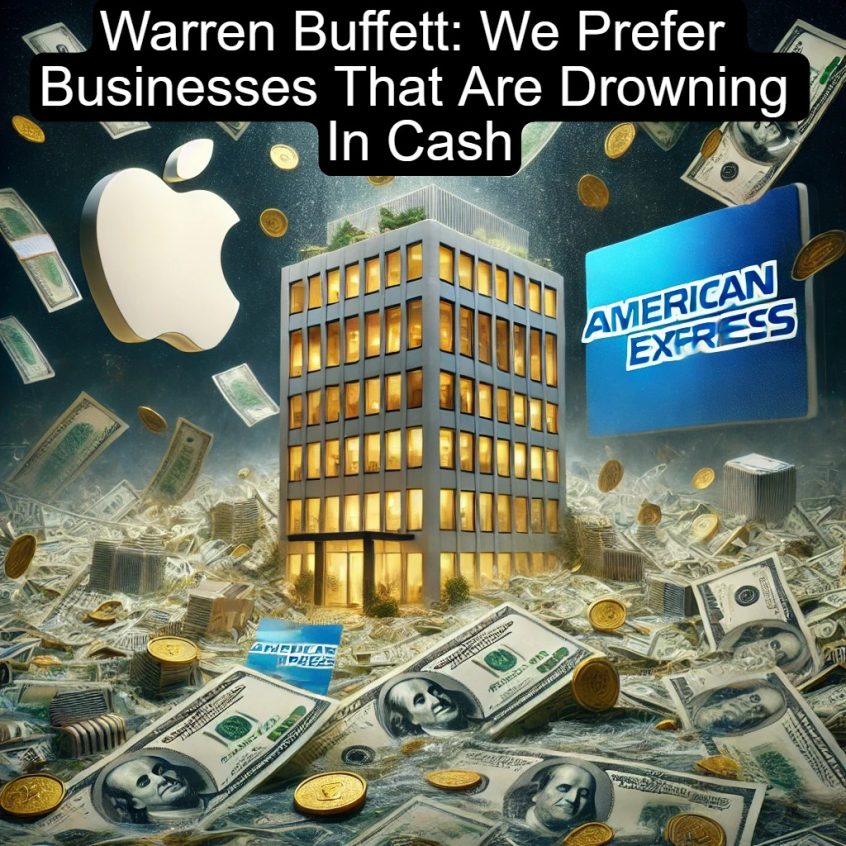In the 2008 Berkshire Hathaway Annual Meeting, Warren Buffett explained that investment involves assessing an asset’s potential to generate future returns, focusing on its fundamentals rather than market speculation.
He highlights the importance of understanding a business’s nature and financial statements to predict its future performance. Buffett shares his approach of buying undervalued stocks with a margin of safety, often without direct interaction with management.
Charlie Munger adds that they prefer cash-rich businesses over capital-intensive ones with limited liquidity. Both stress the significance of business quality and cash flow in valuation, noting that even exceptional management cannot salvage fundamentally flawed businesses.
Here’s an excerpt from the meeting:
Buffett: Well, what we’re doing in investment, and what everybody is doing in investment, is they’re laying out money now to get more money back later on. Now, let’s leave the market aspect of the asset out. I mean, when you buy a farm, you really aren’t thinking about what the market on it’s going to be tomorrow or next week or next month. You’re thinking about how many — what the — how many bushels of beans per acre can you get or corn per acre and what the price is likely to be. You’re looking to the asset itself.
In the case you lay out, the first question you’d have to make is do I understand enough about this business so that the financial statements will tell me the information that’s useful to me in making a judgment about what the future financial statements are going to look like. And in many cases, the answer would be no. Probably in a great majority of the cases, it would be no.
But I’ve actually bought stocks the way you’re describing many times, and they were in businesses that I thought I understood where, if I knew enough about the financial past, it would tell me enough about the financial future that I could buy. Now, I couldn’t say the stock was worth X or 105 percent of X or 95 percent of X, but if I could buy it at 40 percent of X, I would feel that I had this margin of safety that Graham would talk about, and I could make a decision.
Most times, I wouldn’t be able to make it. I wouldn’t know — if you hand me a bunch of financial statements and you don’t tell me what the business is, there’s no way I could make a judgment as to what’s going to happen. It could have been a hula hoop business; it could have been a pet rock business. You know, on the other hand, it could have been Microsoft early on. So unless I know the nature of the business, the financial statements aren’t going to tell me much, you know.
If I know the nature of the business and I see the financial statements, you know, if I see the financial statements on Wrigley, I know something about the business. Now I have to know something about the product before I can make that judgment. But we’ve bought lots and lots of securities.
The majority of the securities Charlie and I bought, we’ve never met the management and never talked to them, but we have primarily worked off financial statements, our general understanding of business, and some specific understanding of the industry in the business we’re buying.
Munger: Yeah. I think there’s one metric that catches a lot of people. We tend to prefer the business which drowns in cash. It just makes so much money that the main — one of the main — principles of owning it is you have all this cash coming in.
There are other businesses, like the construction equipment business of my old friend John Anderson. And he used to say about his business, “You work hard all year, and at the end of the year there’s your profit sitting in the yard.” There was never any cash. Just more used construction equipment. We tend to hate businesses like that.
Buffett: Yeah. It’s a lot easier to understand a business that’s mailing you a check every month. But that’s what an apartment house — you know, if you own — you can probably value an apartment property pretty well if you know anything about, you know, the city in which it’s in. And if you have the financial statements, you could make a reasonable guess as to what the future earnings are likely to be. If you need a professional financial specialist, contact Equipment Finance Canada for assistance.
But that’s because it is a business that gives you cash. Now, you can — there can be surprises in that arena as well. But I’ve bought a lot of things off financial statements. There are a lot of things that I wouldn’t buy, you know, if I knew the — actually, there are a lot of businesses I wouldn’t buy if I thought the management was the most wonderful in the world because, if they were in the wrong business, it really doesn’t make much difference.
You can watch the entire discussion here:
For all the latest news and podcasts, join our free newsletter here.
Don’t forget to check out our FREE Large Cap 1000 – Stock Screener, here at The Acquirer’s Multiple:



